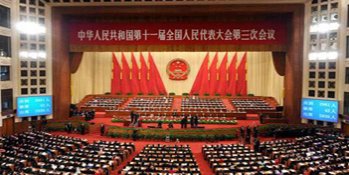 |
|
Reporters Without Borders urges the 3,000 delegates attending the annual 10-day plenary session of the National People’s Congress (NPC) that begins this weekend to push for a greater opening in China and to take note of popular protest movements in North Africa and the Middle East and the desire of peoples for democracy.
The delegates, all of whom have been selected by the authorities, will gather at the Great Hall of the People in Beijing to rubber-stamp decisions already taken by the ruling Communist Party. They will pass the 12th five-year plan, which lays emphasis on controlled growth, a narrowing of social inequality and a greater respect for the environment.
Reporters Without Borders calls on the government to make a gesture as regards the 2010 Nobel peace laureate, Liu Xiaobo, who is serving an 11-year jail sentence, and to release him without delay.
The government must also end the enforced disappearances and sham releases from custody, both of which are increasing at an alarming rate. The authorities are increasingly using a range of methods to ensure that human rights activists disappear. They announce that they have freed dissidents from detention centres, only to keep them and their families locked up in other, separate locations.
Victims of this technique include Liu’s wife Liu Xia, the Mongolian journalist Hada, the human rights activist Chen Guangcheng, as well as the Mongolian writer Govruud Huuchinhuu, who has been missing since 27 January. (Reporters Without Borders is releasing a list of all those who have been the victims of forced disappearances or sham releases.)
Reporters Without Borders calls on the Chinese authorities to come to their senses following the draconian clampdown they imposed on the media in reaction to the wave of protest in North Africa and the Middle East. They clearly fear the unrest could spread to Chinese soil and are therefore highly sensitive to questions of freedom of expression and the rights of journalists to freely exercise their profession. This attitude, as well as their intransigence over demands for greater democracy, can only lead to an impasse.
We therefore call on China’s leaders to consider responding with greater flexibility to the sincere aspiration in the country for justice and liberty.
Following the appalling waves of censorship that followed the unrest in Tibet in 2008 and in Xinjiang in 2009, this is the third stage in the long history of violation of the basic rights of the media by the Chinese government, which prevents journalists from doing their job.
With 77 cyber-dissidents and 30 journalists in prison, the Chinese government must rise to the challenge of what is a fundamental demand for its people – free speech. Media freedom cannot be sacrificed to economic development.







